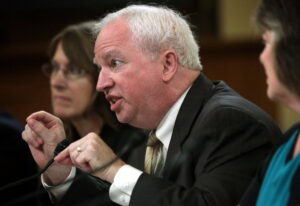CA Judge Orders Trump Lawyer John Eastman To Cough Up Emails To Jan. 6 Committee *Now*
Mess with the bull, sometimes you get the horns.

(Photo by Alex Wong/Getty Images)
Coups 4 Dummies lawyer John Eastman is learning the hard way that the Central District of California is not the District Court in DC.
After stalling the January 6 Select Committee for months, Eastman raced into Judge David O. Carter’s courtroom last week seeking an emergency TRO to block a Committee subpoena demanding that his former employer hand over his emails. Because of course John Eastman used his Chapman University email account to plot a coup against the United States government.

Why Do AI And Legal Professionals Make The Perfect Partnership?

On an entirely unrelated note — AHEM — Eastman “retired” earlier this year from Chapman, where he was a law professor and former dean.
Back in DC, Eastman and his pals have successfully managed to delay a reckoning in federal court. But the former Trump lawyer ran smack into a brick wall when he ran that play in California.
Inside a week, Judge Carter demanded a full briefing, held a hearing, issued a minute order ruling against Eastman, followed it up with a written order disposing of all the issues about the Committee’s supposed illegitimacy that are currently being litigated by the witnesses in DC, ordered production of the emails to begin, and agreed to adjudicate any privilege disputes in camera.
(In fairness, DC judges are kinda busy with hundreds of prosecutions of January 6 rioters.)
Sponsored

Generative AI In Legal Work — What’s Fact And What’s Fiction?


Law Firms Now Have A Choice In Their Document Comparison Software

Why Do AI And Legal Professionals Make The Perfect Partnership?


AI’s Impact On Law Firms Of Every Size

Yesterday, the parties filed status reports to let the court know how the first 36 hours of document production and privilege review were going.
Eastman appeared to be taking a lackadaisical approach, blaming “technical difficulties due to the size of the file” and his travel plans for failure to get cracking. He took serious umbrage at the suggestion that he had “undertaken this privilege review with anything other than the greatest dispatch” and suggests that it would all go faster if the Committee would just waive the request to see his metadata “because conducting a separate privilege analysis on the metadate [sic] for each document will greatly prolong the review process.”
In short: “Plaintiff further believes this Court’s orders to date have made clear the need for expeditious review and further micromanaging is not necessary.”
It was perhaps a strategic error to demand a hands-off approach from a jurist who had already scheduled updates at 48-hour intervals. Judge Carter immediately ordered Eastman to get himself an electronic discovery program and start kicking up 1,500 pages a day, with the metadata. And the lawyer will have to produce a daily privilege log to both the court and the Committee, with any disputed items to be reviewed by Judge Carter, who will “set a briefing and hearing schedule on the asserted privileges and objections.”
If the plaintiff is unhappy about it, he can bring it up in tomorrow’s status memo. Or on Monday at the scheduled status conference. Looks like they’ll be spending lots of time together!
Sponsored

AI’s Impact On Law Firms Of Every Size


How Transactional Lawyers Can Better Serve (And Maintain) Their Clients
Eastman v. Thompson [Docket via Court Listener]
Liz Dye lives in Baltimore where she writes about law and politics.







